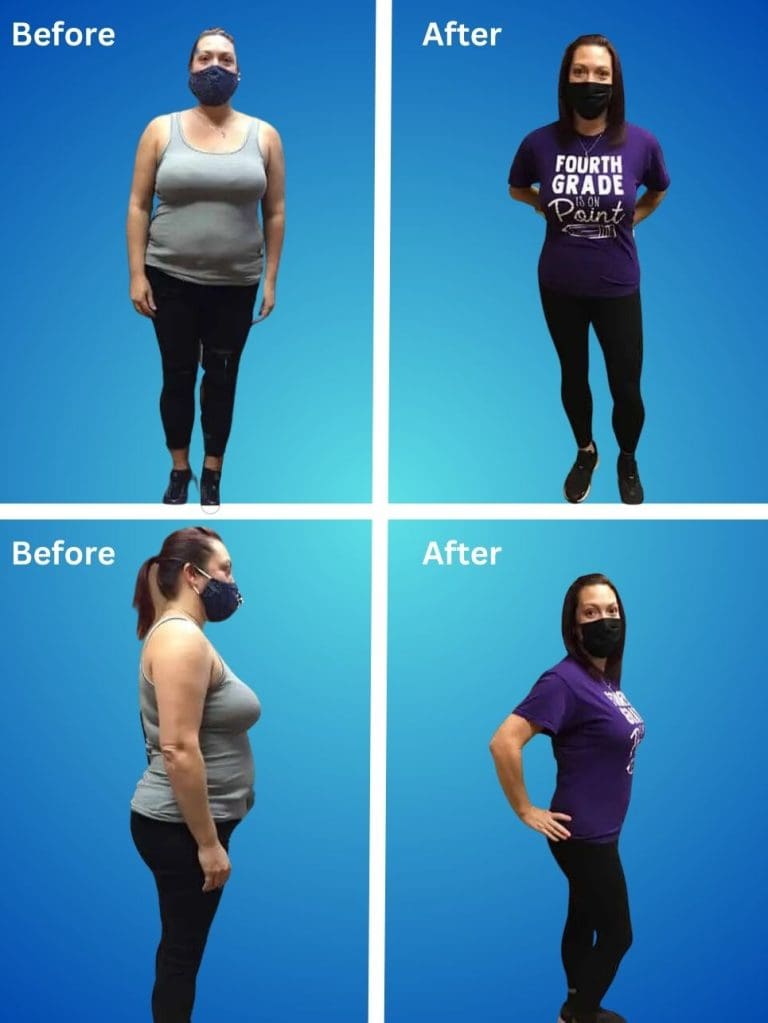Can You Really Burn Calories Without Exercise? A Weight Loss Service Breakdown
Wiki Article
Discovering the Leading Misconceptions and Realities Surrounding Weight Loss for Better Outcomes
The landscape of weight loss is frequently shadowed by mistaken beliefs. Lots of individuals hold on to preferred misconceptions that can hinder their development. For circumstances, the idea that carbohydrates are inherently hazardous or that avoiding dishes can accelerate outcomes is extensive. Nonetheless, recognizing the facts behind these misconceptions is important for reliable weight monitoring. As one browses with these common misconceptions, a clearer image of successful weight loss techniques begins to arise. What insights wait for past these first false impressions?Misconception 1: Carbs Are the Enemy
Several diet plans advertise the concept that carbs are the primary perpetrator behind weight gain, this perspective oversimplifies a complicated problem. Carbs are a critical macronutrient that offers power for daily activities and physical functions. Rather of categorizing all carbs as unsafe, it is vital to identify in between straightforward and complex carbs. Straightforward carbs, found in sugary treats and drinks, can result in fast spikes in blood sugar level and add to weight gain when taken in exceedingly. Alternatively, complex carbs, such as entire grains, fruits, and veggies, offer essential nutrients and fibers that support total health and wellness. The body calls for a balanced intake of macronutrients, and removing carbs entirely can lead to dietary shortages. Lasting weight monitoring includes small amounts and understanding one's individual nutritional needs. Consequently, framing carbohydrates as the adversary disregards their prospective benefits and misrepresents the ins and outs of weight loss.Misconception 2: Missing Meals Assists With Weight Loss
Skipping meals is typically viewed as an efficient approach for weight loss, yet this technique can be detrimental. Many people think that by decreasing their calorie intake via dish omission, they can lose pounds quicker. However, study shows that avoiding meals can cause raised cravings and food cravings in the future, commonly leading to overeating.Additionally, the body may get in a state of hunger, decreasing metabolism to save power. This response can prevent weight loss efforts and cause vitamins and mineral deficiencies, adversely influencing overall health.Moreover, regular meal skipping can interfere with hormone balance, affecting appetite hormones like ghrelin and leptin, which control appetite. Consequently, people may discover it difficult to preserve lasting weight loss. Instead, a balanced technique that consists of regular meals and nutrient-dense foods is advised for reliable weight monitoring and overall well-being.Myth 3: All Calories Are Created Equal
While many individuals might think that all calories add equally to weight gain or loss, this perspective neglects essential aspects such as nutrient top quality, metabolic results, and private reactions to various foods. For circumstances, 100 calories from a nutrient-dense food like almonds will affect the body in different ways than 100 calories from a sugary snack. The former provides advantageous nutrients and promotes satiety, while the latter might cause fast blood sugar spikes and enhanced hunger.Moreover, various foods can alter metabolic rate. Protein-rich foods call for more energy to digest compared to fats or carbs, leading to a higher thermic result of food. Furthermore, people might react variably to specific foods due to hereditary elements, gut microbiota, or personal wellness conditions. The concept that all calories are equivalent streamlines weight loss, disregarding the complicated interactions between food kinds and individual physiology that ultimately affect weight monitoring.Misconception 4: You Can Detect Decrease Fat
The belief that a person can spot minimize fat-- losing weight in certain locations of the body with targeted workouts-- stays an usual mistaken belief. Numerous people assume that performing workouts targeting certain muscle mass teams, such as crunches for the abdominal area or leg lifts for upper legs, will bring about weight loss in those locations. Weight Loss Service. Scientific research shows that fat loss happens evenly across the body rather than in separated regions.When one engages in physical activity, the body activates fat shops throughout, reacting to general caloric deficiencies rather than local exercises. Genetics, body structure, and hormone factors likewise play significant functions in determining where fat loss takes place. Subsequently, an extensive technique that consists of a balanced diet plan and normal cardiovascular and stamina training is vital for reliable weight monitoring. Comprehending this truth can assist individuals established realistic assumptions and focus on sustainable, general health and wellness improvements instead of quick repairsMisconception 5: Consuming Fat Makes You Fat
Misconception 5 insists that consuming fat undoubtedly brings about weight gain. Comprehending the various types of nutritional fats and their duties in weight management exposes an extra nuanced perspective. Healthy fats can be useful and might even aid in accomplishing a well balanced diet regimen and preserving a healthy and balanced weight.Sorts Of Dietary Fats
Many individuals believe that taking in dietary fats straight leads to weight gain, yet this false impression oversimplifies a complex concern. Dietary fats can be classified into 3 main kinds: saturated, unsaturated, and trans fats. Saturated fats, commonly found in animal products, can increase cholesterol degrees and need to be eaten in moderation - Weight Loss Service. Unsaturated fats, which consist of monounsaturated and polyunsaturated fats, are typically located in plant-based oils, nuts, and fish, and are considered advantageous for heart health and wellness. Trans fats, usually found in refined foods, should be prevented due to their negative health and wellness effects. Comprehending these different types of fats is vital for making notified nutritional choices, highlighting that not all fats are equivalent in their effect on health and wellness and weight monitoringDuty in Weight Management
Although consuming dietary fats has long been associated with weight gain, this perspective forgets the subtleties of nutrition and metabolism. In fact, fats play a vital duty in satiety, helping people feel fuller much longer, which can prevent overindulging. Healthy and balanced fats, such as those located in avocados, nuts, and olive oil, can sustain metabolic health and wellness and even aid in weight administration when eaten in small amounts. In addition, the body calls for fats for crucial functions, including hormone production and nutrient absorption. Misconstruing the role of dietary fat can lead to undesirable consuming patterns that prioritize low-fat options, often high in sugars and fine-tuned carbs. Incorporating healthy and balanced fats right into a well balanced diet is essential for effective weight monitoring and overall health and wellness.Misconception 6: Supplements Are Important for Weight Loss
The belief that supplements are crucial for weight loss is an usual false impression. Prioritizing natural foods and evidence-based methods can cause more sustainable and effective results. Relying solely on supplements might ignore the relevance of a balanced diet regimen and healthy way of life selections.Natural Foods First
While some people believe that weight loss supplements are important for losing pounds, evidence suggests that prioritizing all-natural foods is far a lot more effective. Healthy foods, such as fruits, vegetables, entire grains, and lean proteins, give essential nutrients that support a healthy metabolism and promote satiety. These foods are normally reduced in calories yet high in fiber, making them advantageous for weight management. Furthermore, they typically have fewer ingredients and preservatives contrasted to refined options. By concentrating on whole foods, people can cultivate sustainable eating behaviors, which add to long-lasting weight loss success. Inevitably, incorporating health foods right into one's diet regimen not just aids in weight loss however additionally improves general health and read more wellness and well-being.Evidence-Based Strategies
Many individuals wrongly think that weight loss supplements are vital for achieving their objectives, yet research shows that an extra reliable approach counts on evidence-based methods that stress way of living adjustments. Research studies continually show that sustainable weight loss is extra effectively accomplished via balanced nutrition, routine physical activity, and behavioral modifications. These techniques promote lasting behaviors that add to total health and wellness. While some supplements might provide short-lived support, they typically lack the considerable benefits related to a well-shaped strategy. Furthermore, reliance on supplements can bring about overlooking essential dietary and exercise practices. Eventually, individuals looking for weight loss success should concentrate on tried and tested methods that prioritize healthy and balanced eating and active living instead than fast solutions, guaranteeing lasting outcomes and enhanced well-being.Misconception 7: Weight Loss Is All Regarding Determination
Self-discipline is commonly proclaimed as the secret to successful weight loss, this belief oversimplifies an intricate process affected by many elements. The trip of weight loss includes biological, mental, and environmental aspects that expand beyond plain self-control. Aspects such as genetics, metabolism, hormonal discrepancies, and psychological wellness play substantial roles in a person's capability to shed weight.Moreover, outside impacts like stress, accessibility to healthy and balanced foods, and social support can dramatically influence one's success. A reliance solely on willpower can bring about stress and sensations of failing when results are not prompt or constant. Lasting weight loss generally entails a multifaceted method, incorporating well balanced nourishment, normal physical activity, and behavioral modifications. Identifying that self-discipline alone is insufficient enables people to take on much more reliable methods, ultimately promoting a healthier partnership with food and body picture.Regularly Asked Inquiries
How Do Genetics Effect Weight Loss Success?
Genes considerably affect weight loss success by influencing metabolic process, fat distribution, and hunger guideline. Individual hereditary proneness can develop differing actions to diet plan and workout, making weight loss simpler for some and a lot more tough for others.Is It Possible to Drop Weight Without Exercising?

What Duty Does Rest Play in Weight Loss?
Sleep considerably influences weight loss by controling hormones that control cravings and metabolic process. Insufficient sleep might result in enhanced desires and decreased power expense, making it extra difficult for individuals to attain their weight loss objectives properly.How Can Anxiety Influence Weight Management?

Anxiety can considerably affect weight management by causing hormone changes that raise cravings and food cravings for undesirable foods - Weight Loss Service. In addition, it may bring about psychological consuming, causing weight gain and challenges in keeping a healthy way of living
Are There Any Kind Of Wellness Risks to Rapid Weight Loss?
Quick weight loss can present numerous health dangers, consisting of nutrient deficiencies, loss of muscle mass, gallstones, tiredness, and electrolyte inequalities. It is essential to approach weight loss progressively and with appropriate clinical support to ensure safety.Report this wiki page